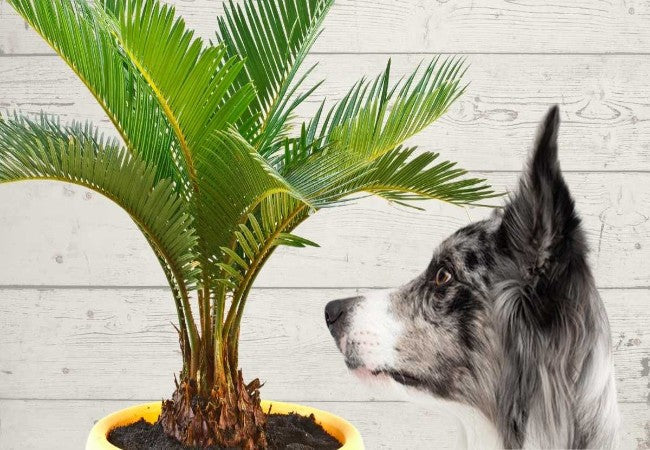Sago Palm Poisoning in Dogs 2025: Vet Reviewed Guide 🌴🐶

In this article
Sago Palm Poisoning in Dogs 2025: Vet Reviewed Guide 🌴🐶
By Dr. Duncan Houston BVSc
Sago palms (Cycas revoluta and related cycads) are among the most toxic plants for dogs. Attractive landscaping specimens can hide a deadly risk: even small ingestion—particularly of seeds—can cause acute liver failure, neurological collapse, and death. This guide explains how to recognize, respond, treat, and prevent sago palm emergencies, with practical advice for 2025 pet parent vigilance.
1. 🌿 What Is Sago Palm Toxicity?
Every part of the sago palm plant is poisonous, but the seeds (nuts) contain the highest concentration of toxins—including cycasin, β‑methylamino‑L‑alanine (BMAA), and other unknown agents.
These toxins damage the gastrointestinal lining, liver cells (leading to hepatic necrosis), and the central nervous system—often severely.
2. ⏱️ When Do Signs Start?
Symptoms typically appear within 15 minutes to several hours post-ingestion—first with GI upset, later progressing to liver and neurological signs.
Although visible plant ingestion helps diagnosis, some dogs may be exposed off-screen. Without timely intervention, mortality rates vary—historically ~50%, though modern data suggests survival with aggressive care.
3. 🧪 Clinical Signs by Stage
a) Early – Gastrointestinal (within hours)
- Drooling, vomiting (possibly bloody), diarrhea (may be melena)
- Loss of appetite, abdominal discomfort, excessive thirst/urination, lethargy
b) Intermediate – Hepatic Signs (1–3 days)
- Jaundice (yellowing of gums, skin, eyes), bruising, bleeding noses, bloody urine/stool
- Ascites, abdominal pain, lab abnormalities—elevated liver enzymes, clotting dysfunction, low glucose
c) Late – Neurological Symptoms (up to 72 hours)
- Weakness, stumbling, tremors, seizures, coma
4. 🆘 Emergency Response Steps
- Seek veterinary care immediately—time is vital.
- Do NOT induce vomiting unless directed by a vet or poison control.
- Contact a poison hotline—ASPCA (888‑426‑4435) or Pet Poison Helpline (855‑764‑7661).
- Note timing and plant parts—helps vet tailor treatment.
5. 🏥 Veterinary Treatment Protocol
• Decontamination
- Induce vomiting with apomorphine or hydrogen peroxide; use activated charcoal (often with sorbitol) to limit absorption
- Repeat charcoal doses may be required
• Hospital Support
- IV fluids to support liver perfusion & hydration; avoid Lactated Ringer’s in liver failure
- Hepatoprotective therapy: N‑acetylcysteine, S‑adenosylmethionine (SAMe)
- Antiemetics: ondansetron, dolasetron
- Seizure management: diazepam, levetiracetam
- Plasma/blood transfusions & vitamin K if clotting compromised
• Diagnostics & Monitoring
Frequent bloodwork—liver enzymes, clotting times, glucose, bilirubin, albumin. Abdominal imaging or biopsy may be used.
• Prognosis
Early intervention greatly improves odds. Survival ranges from ~50% historically, with modern protocols reporting improved outcomes.
6. 📊 Mortality & Survival Insights
- Typical mortality: 32–50%. Modern data suggests lower death rates (~2–5%) with early treatment
- Key survival predictors: early decontamination, aggressive supportive care, no advanced liver damage
7. 🏡 Post-Care & Home Recovery
- Continue liver support meds (SAMe), GI protectants, and avoid toxins (acetaminophen, NSAIDs, xylitol).
- Frequent follow-ups: liver enzyme checks weekly until normalized.
- For lingering anxiety or bonding: use the Ask A Vet app to report progress or concerns.
8. 🛑 Prevention & Safer Landscaping
- Identify and remove all cycads from yards and paths.
- Secure fences around toxic plants.
- Educate visitors about the risk, especially children and pet sitters.
- Use signage or reminders for your household about poisonous plants.
9. 🧩 Breed & Age Risk Factors
| Dog Type | Risk Level | Prevention Tips |
|---|---|---|
| Puppies/curious dogs | High | Remove cycads entirely; supervise outdoor time. |
| Working/breed dogs | Medium | Complete garden check; educate handlers. |
| Seniors/health‑compromised | Very High | Zero tolerance for any plant ingestion; clear landscape. |
10. 📌 What Every Pet Parent Should Remember
- Liver and neurological damage escalate fast—act without delay.
- Early charcoal and hospitalization dramatically improve odds.
- Maintain a toxic-free garden; consult landscape professionals.
- Reach out with symptoms or concerns anytime via the Ask A Vet app.






